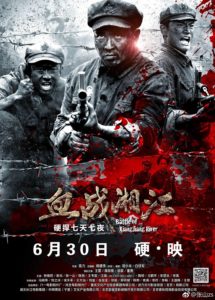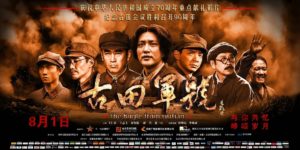The Bugle from Gutian
古田军号
China, 2019, colour, 2.35:1, 119 mins.
Director: Chen Li 陈力.
Rating: 6/10.
Talky but engrossing drama centred on a crucial CPC policy change during the 1930s civil war.
Western Fujian province, southern China, 1929. After being forced by Nationalist troops to evacuate their base in Jinggangshan, Jiangxi province, and move south to the county of Changting, Fujian province, Mao Zedong (Wang Renjun) and Zhu De (Wang Zhifei) assemble the remainder of their troops in western Fujian. Because of his perceived focus on leading a rural rabble and disobeying orders, the CPC Central Committee, based in Shanghai, had already stripped Mao Zedong of his committee post and also of his Hunan province Party secretaryship; but along with Zhu De, a general, he retained influence over the so-called Fourth Red Army, made up of peasants, defectors from the Nationalist army, and other Red soldiers. With morale low among the troops, Mao Zedong and Zhu De – although disagreeing on strategy – enforce disciplinary measures against a group of soldiers who have exploited locals. After many months on the road, Liu Angong, aka Ji Liang (Hu Bing), finally arrives with a letter from the Central Committee ordering Mao Zedong to disband his army and turn to guerrilla warfare instead. Mao Zedong refuses, arguing that his troops are just too dispersed, not lacking the necessary military skills. During several meetings – at which Lin Biao (Zhang Yishan), a company commander loyal to Mao Zedong, and his comrade Chen Yi (Liu Zhiyang) are also present – Mao Zedong and Liu Angong argue fiercely, with the latter trying to take over military leadership, on the grounds that Mao Zedong no longer has the official authority. Throughout the period Mao Zedong hides the fact that he is suffering from malaria and insomnia. Despite that, he still works long hours, and takes under his wing a 13-year-old boy, Chi Youtian (Zou Xianyu), who was orphaned during the fighting around Jinggangshan. He gives him a bugle carried by his late father, whom Mao Zedong dubs a “hero”.
REVIEW
A loose dramatisation of the political struggle in the months that led to the Gutian Conference of Dec 1929, The Bugle from Gutian 古田军号 is a PRC 70th anni production that – contrary to its militaristic title – isn’t just a string of battle scenes. In fact, apart from regular montages of recent Communist-Nationalist warfare, it’s actually a thoughtful, well-characterised talkpiece, with a series of meetings in which Mao Zedong, then virtually outlawed by the CPC Central Committee in Shanghai, asserts his personal control, along with the general Zhu De, over the Fourth Red Army and establishes the crucial ideology (ratified at the Gutian Conference) that the Red Army is at the service of the Party and not an independent entity – a rule of “democratic centralism” that remains a pillar of CPC policy. On release, however, the film made only a very modest RMB58 million.
 The film is in many respects a prequel to the earlier Battle of Xiangjiang River 血战湘江 (2017, see poster, left) – also directed by August First Film Studio staffer Chen Li 陈力 – which focused on the Red Army’s 1934 escape from Nationalist forces and the crossing of the Xiang River in Hunan province, a move that effectively kick-started the Long March. Both films have several of the same real-life characters and centre on Mao’s efforts to over-ride strategies dictated by the Central Committee, eventually gaining control of the military and chairmanship of the Party. But where Battle is basically 110 minutes of war footage that’s totally confusing unless you have a PhD in the subject, Bugle is virtually the reverse, a talky but engrossing drama about a complicated but crucial event in CPC history.
The film is in many respects a prequel to the earlier Battle of Xiangjiang River 血战湘江 (2017, see poster, left) – also directed by August First Film Studio staffer Chen Li 陈力 – which focused on the Red Army’s 1934 escape from Nationalist forces and the crossing of the Xiang River in Hunan province, a move that effectively kick-started the Long March. Both films have several of the same real-life characters and centre on Mao’s efforts to over-ride strategies dictated by the Central Committee, eventually gaining control of the military and chairmanship of the Party. But where Battle is basically 110 minutes of war footage that’s totally confusing unless you have a PhD in the subject, Bugle is virtually the reverse, a talky but engrossing drama about a complicated but crucial event in CPC history.
Now in her mid/late 50s, Chen has a career in film and (some) TV that dates back to 1986, yoyo-ing between relationship dramas and military/political potboilers, with the latter taking precedence in recent years. Of the former, she’s best known for the lyrically shot rural drama Duet 两个人的芭蕾 (2005), about a mother training her adopted daughter to be a ballet dancer, and the subtler and more emotionally layered Love on Gallery Bridge 爱在廊桥 (2012), centred on a middle-aged village woman and the three men in her life. Like Love, Bugle was also shot by d.p. Huang Shan 黄山 and set in Fujian province, though, with its period blue-grey tones (largely male uniforms of the time), is less richly coloured in general. However, in its natural lighting of wooden village interiors, it’s equally well crafted.
Though the subject of Bugle may seem pretty arcane to anyone except political scholars, the script, lead written by veteran Tian Yunzhang 田运章 (who also wrote Chen’s The Story of Zhou Enlai 周恩来的四个昼夜, 2013), keeps all the ideological arguments at a human level, clearly personified by three people – Mao, the peasant leader, Zhu, the military man, and Liu Angong, an ambitious Central Committee rep from Shanghai who insists on executive instructions being carried out. As the last, actor-model Hu Bing 胡兵, 49, mostly a TV performer, is among the most striking presences in the movie, with looks recalling a younger Liang Jiahui 梁家辉 [Tony Leung Ka-fai] and easily squaring up to the softer performance by TV actor Wang Renjun 王仁君, 36, as the young, patient but clever Mao and to the serious-faced playing by Wang Zhifei 王志飞, 55, also better known from TV, as Zhu, the more stolid and older army man. Younger actor Zhang Yishan 张一山 (Escape Route 夺路而逃, 2016; Love Trip 毕业作品, 2018) is okay as a young Lin Biao, and, underlining the film’s connection with the earlier Battle, veteran Sun Weimin 孙维民, 65, a regular in Chen’s films (e.g. the good-hearted baker in Love on Gallery Bridge), pops up in the same role of a village tailor.
More problematical is the decision to tell the whole story as a reminiscence by the grandson of a young boy, orphaned during the civil war, whom Mao took under his wing (and gave the titular bugle to). The concept gives events a kind of “observed history” slant, seen through the eyes of a 13-year-old kid, that works quite well; but the modern-day scenes that bookend the film – a dragon dance in a Hakka tulou; the boy’s grandson with his grandpa – are a distraction from what is a period drama. The growing habit in Mainland movies of including modern sequences in period drama – to show how far the country has progressed – is not always justified dramatically. A further jolt to the film’s otherwise impeccable period credentials – which include small details like everyone constantly snacking on sweet potatoes due to the shortage of food – is that no one, including Mao, is ever shown with a cigarette.
In addition to Huang’s widescreen photography, the fluid cutting by the team of three editors and a delicate, unbombastic score by actress-composer Ju Wenpei 居文沛 (who also scored Battle) further mitigate the copious dialogue by giving the film an easy flow.
CREDITS
Presented by Fujian Film Production (CN), August First Film Studio (CN), Fujian Film Studio (CN), Hebei Radio & TV Culture (CN), Hubei Yangtze River Film Group (CN).
Script: Tian Yunzhang, Xu Baoqi, Chen Li. Photography: Huang Shan. Editing: Kong Lingyao, Guo Chen, Zhao Yikun. Music: Ju Wenpei. Art direction: Li Wei. Styling: Liu Xiaoli. Sound: Liu Juntao, Ji Chenggang, Wang Yin’gang. Action: Li Hailong. Executive direction: Cao Hong.
Cast: Wang Renjun (Mao Zedong), Wang Zhifei (Zhu De), Liu Zhiyang (Chen Yi), Hu Bing (Liu Angong/Ji Liang), Zhang Yishan (Lin Biao), Dong Yue (He Zizhen), Zou Xianyu (Chi Youtian), Sun Weimin (Lin, tailor), Li Youbin (paper-mill owner), Xu Jian (Zhou Enlai), Chun Xiao (Zhang Su’e), Wang Guodong (Deng Zihui), Jiang Miao (Zeng Zhi), Tian Muchen (Luo Ruiqing), Jiayang Sangzhu (Fu Baicui), Wang Heyu (Fu Ximeng), Chu Xingyi (Wei Jinbo), Chen Ye (Gu Laoliu), Zhao Mingchuan (Fan Jiushan), Guo Baisong (Zhang Su’e’s father), Ding Dong (Yang Chunwa), Song Yu (Chi Youtian’s father), Huang Zhiyi (Chi Youtian’s elder brother), Huang Shanjin (adult Chi Youtian), Chen Mingnan (Chi Wenlong).
Release: China, 1 Aug 2019.
